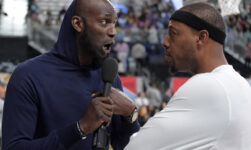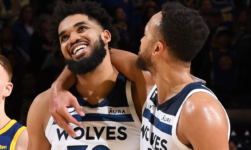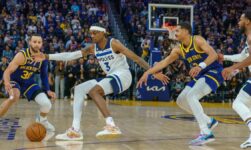Nicolas Batum strips the ball from Jazz center Rudy Gobert during a playoff game last season. The Clippers forward’s defense continues to improve in his 14th season. (Gina Ferazzi / Los Angeles Times)
Dressed in a navy blazer and white polo, Nicolas Batum took a front-row seat inside Paris’ Elysee Palace last September at a reception hosted by President Emmanuel Macron for France’s Olympic and Paralympic medalists. Batum’s silver medal wasn’t his only weighty honor: He’d just received the rank of knight in France’s National Order of Merit.
It was always going to be a memorable day. Yet something unexpected happened as Macron began ad-libbing his speech. In a room filled with athletes, he called attention to one: Batum, whose game-saving block of a layup against Slovenia one month earlier secured France a berth in basketball’s gold-medal game.
“Everyone remembers this block by Nicolas Batum,” Macron said. The swat off the backboard, Macron predicted, would become an “image called to adorn the rooms of teenagers.”
The unexpected presidential praise jolted Batum, who looked around and saw a room staring back at him. There was also some irony to Macron’s word choice because upon arriving in the NBA in 2008, the 19-year-old Batum was a self-described poster boy for the type of player more concerned with scoring than stops.
“I wasn’t a defensive player in France. I sucked,” Batum, 33, said recently. “I was playing defense, but it wasn’t my main concern, to be honest.”
Fourteen years later it’s impossible to know how many, if any, pictures of Batum’s passing-lane denials against wings and wily defense against centers adorn the walls — or smartphone backgrounds — of Clippers fans. But at an age when veterans’ skill sets often erode, the 6-foot-8 forward has become a more versatile defender than ever while adding defense against centers to his expanding repertoire — a change that has shifted the course of two playoff series, two 20-point comebacks in January and helped hold together a Clippers season that could have frayed months ago as injuries mounted.
“He’s the best glue guy in the league,” Clippers guard Reggie Jackson said.
Story continues
Clippers forward Nicolas Batum attempts to block a layup by Nuggets center Nikola Jokic during a game earlier this season. (Robert Gauthier / Los Angeles Times)
“When you combine his IQ and his care and passion for the game with those instincts and his length, he just blows up so much for us defensively,” said assistant coach Dan Craig, the Clippers’ defensive architect. “When we have a certain game plan, he’s one of the best at locking in to how we want to blow up that guy tonight, or that action, and he’s ahead of it. He might not do it every single time but he’s pretty damn close and he knows when he doesn’t and he calls himself out and holds himself accountable.
“He’s one of my favorite players I’ve had a chance to coach.”
Since newly acquired wing Norman Powell joined all-NBA defenders Kawhi Leonard and Paul George on the long-term injured list Feb. 12, the Clippers have allowed the NBA’s fewest points per 100 possessions, all while Batum has shadowed springy point guards such as Tyrese Maxey, giving them space to guard against blow-by drives, and also draped himself against towering centers.
“He’s a brilliant basketball mind,” said Golden State coach Steve Kerr, whose Warriors pursued Batum in free agency last summer. “He’s kind of a step ahead of the game; reminds me a little bit of Andre Iguodala in that way. Always making the right play, always in the right place at the right time. And capable of guarding everybody.”
As the Clippers watched film before a late-January game, coach Tyronn Lue asked young wings Terance Mann and Amir Coffey to pay attention to the way Batum combined his experience and energy. One game earlier, Batum had drawn a charge 94 feet from the basket while guarding a ballhandler full-court.
“You don’t see that a lot especially a guy like him, with how many years he has in the league and he’s still doing it,” Coffey said. “I think that was my first ‘wow, this dude is serious.’”
Two games before that, Batum had smartly begun pressuring Philadelphia center Joel Embiid, a leading most-valuable-player candidate, well before he could set his feet inside the paint and call for the ball.
“To exert that kind of energy at that age?” one NBA assistant said. “I didn’t think he had this in his tank.”
::
Batum spoke spotty English but understood enough in the summer of 2008 to grasp what Monty Williams, then a Portland assistant, was trying to say.
“He really, really, really took me under his wings the day I got in the NBA,” Batum said. “Couldn’t speak English, didn’t know nothing about this country, and it’s not about basketball; he really took me under his wing as a man and I needed that. He really pushed me like, ‘This is what you need to do if you want to play. And it starts on defense.’”
For Clippers forward Nicolas Batum, guarding centers like Philadelphia’s Joel Embiid (above) and Denver’s Nikola Jokic is part of his defensive repertoire. (Matt Slocum / Associated Press)
Batum didn’t arrive as a bad defender, Williams said. Even without knowing Portland’s defensive schemes, Batum’s 7-1 wingspan and instincts helped him break up passes. He relied on those physical gifts in France too. But with the team’s offense flowing through other players, and Batum agreeing to allow Williams to change the mechanics of his jump shot, his longevity hinged on defense.
Batum’s long arms, “freak athleticism” and quick-processor mind — Williams likened Batum’s ability to hear a defensive instruction once and perform it to that of Anthony Davis — gave him technical advantages to improve. During hours together in the gym, Williams saw that Batum “was willing to do whatever to have a good career and get on the floor,” he said.
“He wasn’t afraid to guard the Kobes and the [Dwyane] Wades. At the time those were the two premier wings from the two-guard position anyway that everybody had a tough time trying to guard. It wasn’t that he would lock those guys up, because he was a young player. For me, it was the fact that he just would not back down.”
Batum is no longer the lithe teenager trying to keep pace with bulked-up grown men. He’s a veteran attempting to use his experience to beat younger, quicker players, the evolution of a player who has “been like four or five different players since [I got to the NBA],” Batum said. “That’s the thing I’m pretty proud of, is I always find a way to change my game to stay.”
Yet since joining the Clippers in 2020 he also is in some ways back in his same rookie role. No longer asked to shoulder the kind of scoring burden he faced in his later seasons with the Trail Blazers and during his max-contract tenure in Charlotte, he has poured his energy back into defense, impressing the Clippers with his “care factor” as he once did with Williams.
“When we lose a game and he knows that we didn’t bring it, he comes in the next day and he’s pissed,” Craig said. “He holds himself accountable and gets upset. That’s rare too; not all guys do that. … Nico will come right up to you and let you know: ‘That was bulls— last night; I didn’t play well. I’ll be ready next game.’
“That’s why I say that he cares. For him to call himself out and maybe a day or two later, that’s pretty special.”
Craig said it was why trailing Dallas 2-0 in a best-of-seven, first-round playoff series last June, the Clippers weren’t wary about trying a smaller lineup that would require Batum to do something he’d almost never done and guard centers for long stretches, including 7-2 Kristaps Porzingis and, occasionally, 7-3 Boban Marjanovic.
The adjustment helped swing the series and smaller lineups spurred a rally from another 2-0 hole against Utah the next round. Before the Western Conference finals, Williams told his Phoenix players something he knew from experience — that Batum should be respected as a disruptive defender the same as Leonard and George.
Clippers forward Nicolas Batum draws a charging foul against Suns forward Mikal Bridges during Game 4 of the Western Conference finals last year. (Robert Gauthier / Los Angeles Times)
::
Days into his first training camp with the Clippers in December 2020, Batum saw something special in a teammate’s game. He pulled aside Mann, a guard coming off a rookie season in which he was rarely used.
“I’ll never forget it, he literally sat me down and was like, ‘Listen, you’re not playing a lot right now but I promise we’re going to need you,’” Mann said. “I didn’t believe it at the time. I was like ‘Yeah, yeah. I’m not going to be playing in the playoffs.’
“It actually turned out that way. It was crazy.”
Last summer, at end of his first Clippers season, Batum next tried to predict the future for himself.
He knew that he and the NBA were not the same as in 2008. Multiple big men no longer filled the same lineup and the paint but roamed around the perimeter, where Batum’s added weight over his career could help him withstand their force. Believing future matchups against centers were likely, Batum began watching videos of the two players who, in his estimation, are the best at guarding everyone: Golden State’s Draymond Green and Hall of Famer Dennis Rodman.
It helped create a strategy for a season in which Batum’s willingness to take on any assignment to stay on the court has meshed perfectly with Lue, who will try any strategy to win. Two November matchups against Minnesota’s Karl-Anthony Towns produced positive dividends — a matchup that could be critical in April if the Timberwolves and Clippers meet in the play-in tournament.
“I tried to be physical with him, I tried to make him work, I don’t try to stop them — I can’t,” Batum said. “That’s not my goal when I get into those guys. It’s make them work, get them tired, try to start my defense and not wait for them inside but sometimes start my defense at half court.
“… And some nights, yeah, one of those guys is [going to] really kick my ass. It’s going to happen for sure. This is the NBA. But yeah, I tried to add that to my game.”
Clippers forward Nicolas Batum steals an inbounds pass intended for Heat center Bam Adebayo during a game earlier this season. (Robert Gauthier / Los Angeles Times)
Batum’s IQ helped him sniff out and break up an inbounds pass intended for Miami center Bam Adebayo in November, sealing a last-second victory. In January, even with the Clippers playing 7-foot center Ivica Zubac, Batum was handed the assignment of Denver’s Nikola Jokic, and his denials helped quiet the reigning MVP and spark a 25-point Clippers comeback. Less than two weeks later, Batum’s physical pressure pushing Embiid out of the paint before the caught the ball in the second half led to a 24-point comeback.
Craig credited Batum for setting the defensive tone as a “major, major contributor to why we started off well” this season.
Since Feb. 1, Batum has averaged 22 minutes per game, two less than his season average, a choice by the coaching staff to limit his mileage to prime him for the postseason, a decision made easier by the presence of new teammate Robert Covington. Still, Batum has guarded centers on nearly 15% of opponents’ possessions, double his share of last season. Centers are shooting 48% against Batum, down from 57% last year.
Last August, weeks before Macron’s Olympic reception, Mann was rooting for Batum to be rewarded as France played in the gold-medal game against the U.S.
“Especially how we didn’t get to get a ring, Kawhi got hurt and we kind of got messed up in the playoffs, I wanted him to get that gold bad,” Mann said.
A last-second loss delivered silver instead. Injuries could again block the Clippers’ championship aspirations. For now, Batum’s Clippers teammates hope he receives something else: his due as a defender, one as disruptive as ever.
“You can’t compare his game,” Mann said, “to anyone in the league.”
This story originally appeared in Los Angeles Times.






